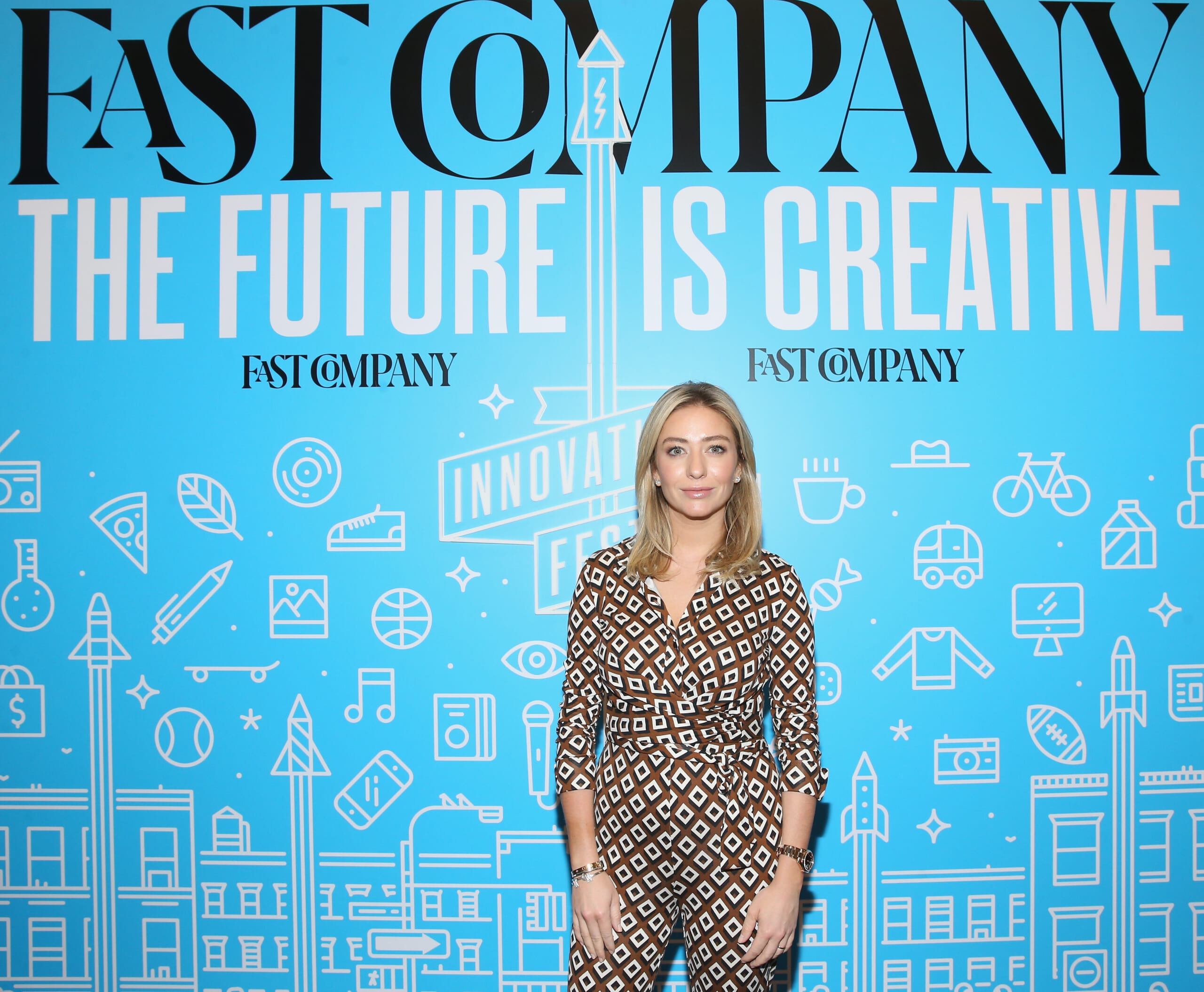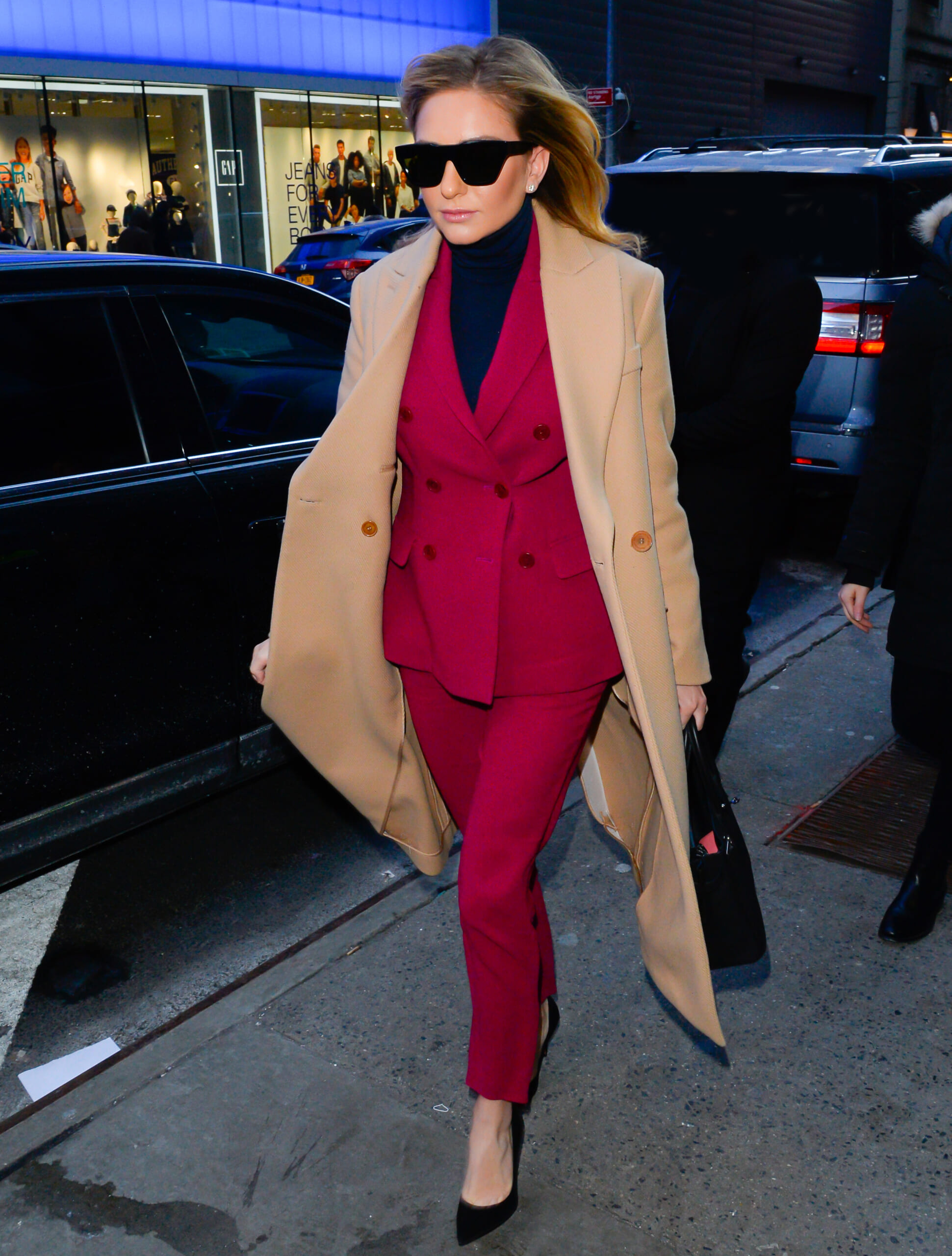How Whitney Wolfe Herd Became a Billionaire Bumble Boss
At age 31, Whitney Wolfe Herd became the world’s youngest self-made female billionaire.

On February 11th, from the Bumble offices in Austin, Texas, Whitney Wolfe Herd virtually rang the bell to open the Nasdaq exchange in New York. Wearing a brilliant yellow power suit and holding her son in her arms, the young mother celebrated as yellow confetti and balloons showered down around her and her team.
The entrepreneur’s company, Bumble, had just begun publicly trading, instantly making the 31-year old the youngest woman to ever bring a company public as well as the youngest self-made female billionaire on the planet.
The image of a strong, confident, female billionaire at such a significant moment was a striking sight for a financial world that has always been male dominated. But it also served as a metaphor for Wolfe Herd’s professional and personal journey. She has upended corporate norms and stereotypes, pushed back when the status quo impeded her path, and turned one of society’s most enduring, and uneven, power dynamics into an opportunity to build a social empire that stretches from dating and friendship to professional networking.
She was the right woman, at the right time, to not simply point out problems she saw, but turn them into opportunities to both impact the world and build a thriving, extremely valuable business simultaneously.
https://www.instagram.com/p/CLLFkwBLyfG
Born and raised in Salt Lake City, Wolfe Herd first began showing her entrepreneurial spirit during her studies at Southern Methodist University. She raised money to help victims of the BP oil spill by partnering with stylist Patrick Aufdenkamp to create and sell bamboo tote bags, and launch the non-profit Help Us Get Cleaned Up Project. But despite success, the future business titan still hadn’t found the best outlet for her skills and determination. Speaking to Harper’s Bazaar UK, Wolfe Herd recalled, “I knew I was ambitious, I knew I was passionate, and that I wanted to change the world in some shape or form, but I had no idea what that might look like.”
After graduation, Wolfe Herd spent time volunteering in Asia before joining Hatch Labs, a California startup incubator. It was here where she met Sean Rad, whom she eventually teamed up with to launch the dating app Tinder. As the Co-founder and VP of Marketing, Wolfe Herd led its college campus-focused outreach efforts that allowed the venture to succeed and grow into the global brand it is today.
Despite this success, and her role in such progress, Wolfe Herd’s tenure at Tinder concluded dreadfully. Leaving the company in 2014, she initiated legal action stemming from a relationship. Eventually settling out of court, it was emblematic of the societal problems that have grown out of both dating and the internet, the very foundations of Tinder’s DNA.
When Oxford Dictionaries named “toxic” as the 2018 word of the year, it was selected not just as a trending, commonly-used phrase, but as a sort of commentary on the current state of modern society. From social media to mass media, from our public discourse to our private lives, it seemed to many as if toxicity had indeed creeped its way into many aspects of society.
Perhaps nothing exemplifies this modern concept of toxicity as vividly the internet. Amazon’s Jeff Bezos was prescient in observing that “there is something about email that turns off the politeness gene in people.” Wolfe Herd took this idea to heart. Speaking with CNBC in 2019, she paraphrased this notion, posing that “when humans can hide behind a screen, when they’re anonymous essentially, they lose their kindness gene.” But while many have observed this phenomenon, and some raise awareness of this negativity and its potential impact, it is Wolfe Herd who figured out a way to make a tangible difference in this area, and at a profit nonetheless.

The internet’s ability to provide users with anonymity at the cost of accountability is no secret, and the road from a lack of accountability to an abundance of insidious and appalling behaviors, is hardly a secret. But whereas many saw this darker side as an inescapable byproduct of the web, Wolfe Herd saw it as an opportunity. At Tinder she had witnessed firsthand the way in which the toxic nature of the internet, along with long-held assumptions about gender and dating norms, made the online dating experience an unpleasant one for many women.
In 2019, Wolfe Herd explained as much to the Female Founders Fund (FFF), recalling, “Very early on in my career, I saw that a lot of things were broken in the way that people treated each other online, especially as it pertained to the antiquated gender dynamics of dating. Men have always been told to chase and women have been told to wait, and that’s just wrong on so many levels.”
The idea behind Bumble is relatively straightforward. By only allowing the woman to send the first message to a match, it removed many of the negative aspects that had grown within Tinder and other dating apps. It made the dating app space feel like a more welcoming and safe place for women to explore and take control of their dating lives.
Women on social media were often sent unsolicited lewd images or messages, or overwhelmed by the sheer quantity of men messaging them at a given time. Some of this can be attributed to the anonymity that the online forum provides, but part of it dates back millennia. Societal norms stated that men are the ones who are supposed to initiate romantic interactions, whether flirting, dating or even proposing marriage. But these “chivalrous” traditions often made online dating a less welcoming platform for women to try.
In the same interview with FFF, Wolfe Herd highlighted the historical forces at play. “By empowering women to make the first move, they have the chance to set the tone of the conversation, which leads to a more balanced and mutually respectful relationship dynamic from the start. “This is important because we find that when women are empowered, everyone is empowered! When you create a space where people can ask for what they want (in love, in friendship, in business), it opens up the conversation for transparency and direct communication; everybody gets to ask for what they want, and everybody wins.”
As the recent IPO shows, the idea was a golden one, and the Bumble app quickly grew into one of the most popular mobile dating apps. But it also showed that if Wolfe Herd could take some of the toxicity out of online and mobile dating, there could be an opportunity to do the same in other aspects of a woman’s life, including meeting new friends or building professional networks to advance their career.
Wolfe Herd didn’t shy away from this idea, worried that it might water down the original purpose of the Bumble app. Instead, she began expanding the dating platform into a female-driven social networking empire. “My vision hasn’t changed; rather, it’s evolved just as Bumble has evolved over time,” she told FFF. “Soon after Bumble launched as a dating app, I realized that women should be empowered to make the first move in every aspect of their lives, not just in dating. Today, Bumble has transitioned into an all-encompassing social network that helps people connect beyond dating through Bumble BFF (friend-finding) and Bumble Bizz (professional networking).”
https://www.instagram.com/p/COqGAEkhkfP
The now-billionaire insists that these endeavors weren’t a result of Bumble’s rapid growth, but rather part of the grand scheme she envisions for herself and the company she founded. “Expanding into friendship and professional networking was always part of the vision,” she emphasized to FFF. She went to add that “Additionally, we are always listening to our users and we quickly learned that there was a demand for features that allowed users to find connections beyond just dating.”
As a result, she noted, “That made it a very natural transition for us to evolve into an all-encompassing social networking platform.” It also expanded the company’s potential user base, and brought countless users into the Bumble network who have no interest in finding a date through Wolfe Herd’s company, but find the connections it cultivates useful in their professional and/or non-romantic social lives.
Following its IPO, Bumble’s share prices rose, valuing the company at more than $13 billion, and making Wolfe Herd’s net worth roughly $1.5 billion at the time of writing. Even if wealth isn’t the driving factor for Whitney Wolfe Herd, expanding women’s power in corporate leadership roles (and the financial benefits these provide) remains at the forefront of her mind moving forward with her now public company. Referencing her female-led business being an outlier in financial news, the passionate CEO told Bloomberg that “Hopefully this will not be a rare headline. Hopefully this will be the norm.”
In her celebratory Instagram post following the Bumble IPO, Wolfe Herd made it clear that not only is her work far from finished, but that she hopes to inspire countless more female entrepreneurs to ignore the toxicity and lack of kindness facing them in today’s digital world and businesses. Her advice to those young women hoping to emulate her successes? “Never take no for an answer, believe in yourselves, and turn your pain into purpose. Most important, treat people with kindness and dream big.”









